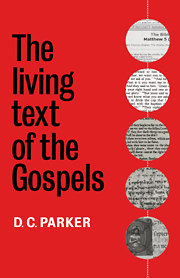Book contents
- Frontmatter
- Contents
- Preface
- List of abbreviations and frequently cited works
- 1 The theory
- 2 The materials
- 3 The practice
- 4 ‘As our Saviour taught us …’: the Lord's Prayer
- 5 The sayings on marriage and divorce
- 6 The story of the woman taken in adultery
- 7 Secrets and hypotheses
- 8 The endings of Mark's Gospel
- 9 The last three chapters of Luke
- 10 The development and transmission of the Fourth Gospel
- 11 From codex to disk
- 12 The living text
- Index of citations
- Index of Greek New Testament manuscripts
- Index of names and subjects
5 - The sayings on marriage and divorce
Published online by Cambridge University Press: 05 June 2012
- Frontmatter
- Contents
- Preface
- List of abbreviations and frequently cited works
- 1 The theory
- 2 The materials
- 3 The practice
- 4 ‘As our Saviour taught us …’: the Lord's Prayer
- 5 The sayings on marriage and divorce
- 6 The story of the woman taken in adultery
- 7 Secrets and hypotheses
- 8 The endings of Mark's Gospel
- 9 The last three chapters of Luke
- 10 The development and transmission of the Fourth Gospel
- 11 From codex to disk
- 12 The living text
- Index of citations
- Index of Greek New Testament manuscripts
- Index of names and subjects
Summary
Jesus said ‘I am the way, the truth and the life’, not ‘I am the way, the social convention and the life.’
Gregory the GreatIt has sometimes been claimed that words of Jesus were reproduced particularly carefully and reverently by scribes. This claim is based on the belief that his words were regarded as so sacred that, while errors of all kinds might be found in less important passages, sentences and phrases, they were handled as reverently as the Massoretic tradition preserved the oracles received by Moses. The claim owes everything to piety, and nothing to the study of the manuscript evidence. Examine any edition of the Gospels that extensively details the manuscript evidence, and you will find that the number of variant readings in a narrative is small. Come to a block of sayings, and the number rises dramatically. The complexity of interpreting Jesus' sayings led to an increase in variant readings. We have encountered this already in the Lord's Prayer, which one might expect to exist in a single form if anything did. But we come now to a problem more thorny and to a situation more tangled than those we have studied so far.
The basic reason for the complexity in the passages we are to study and in many others of Jesus' sayings is precisely the importance accorded them. A recent major study (whose title neatly makes the point) has illustrated how much copyists might change the text in order to bring out the meaning which they believed to be correct.
- Type
- Chapter
- Information
- The Living Text of the Gospels , pp. 75 - 94Publisher: Cambridge University PressPrint publication year: 1997



